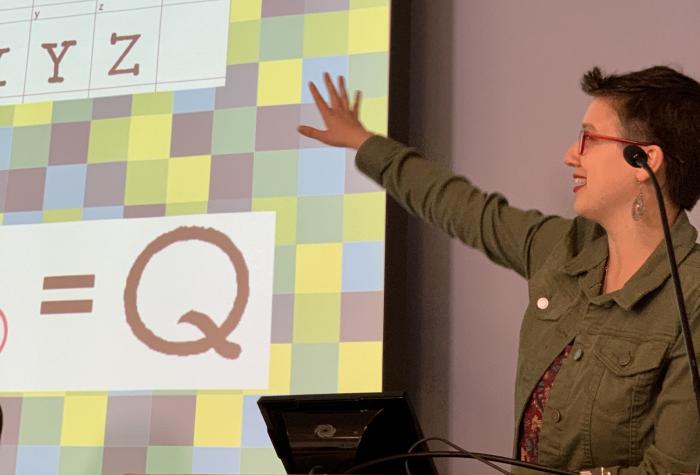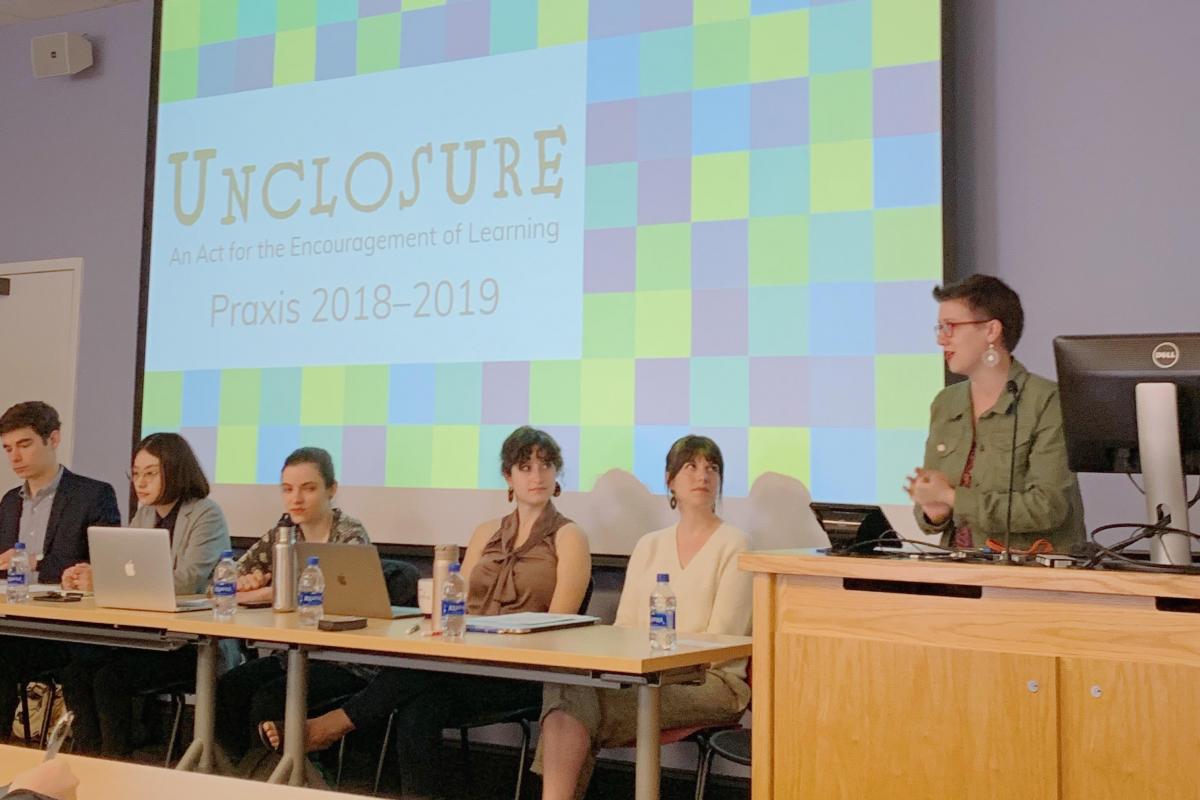Praxis: Revisiting "New Hampshire" and the Public Domain

Praxis Fellow Catherine Addington shares her typography contributions to "Unclosure."
Praxis: Revisiting "New Hampshire" and the Public Domain
On April 29, Praxis program fellows Catherine Addington, Zhiqiu Jiang, Emily Mellen, Eleanore Neumann, Mathilda Shepard, and Christopher Whitehead presented the results of their year’s collaboration. As the eighth Praxis Fellows cohort since the Scholars’ Lab program’s inception in 2011, this group’s project highlights innovative ways of engaging with online material in light of the expansion of the public domain in 2019. Riffing on the word “enclosure,” the Praxis Fellows arrived at the project title “Unclosure” which aims to push back against any notions of cultural enclosure and to reignite interest in materials in the public domain. Mathilda Shepard, a doctoral student in the Spanish, Italian, and Portuguese department said that the project focused on answering two core questions: “What does it mean for a work to enter the public domain?” and “What does it mean to engage the public domain digitally?”
To that end, the fellows selected Robert Frost’s “New Hampshire,” the titular poem from his Pulitzer Prize-winning collection, as a case study for their working theory of public domain pedagogy. As a canonical work of poetry, the Praxis Fellows considered “New Hampshire” an ideal candidate for testing hypotheses about what constitutes the cultural commons and how existing conceptions of those commons can be changed to be more inclusive of authors, subjects, and cultures that have historically been underrepresented in the Western literary canon. Thus, a large part of the project’s aim is to encourage both scholars and the general public to push past epistemological biases that exist along the dimensions of race, gender, geography, and more.
Getting to the substantive core of the project, Praxis Fellow Christopher Whitehead explained that “New Hampshire” allowed him and his collaborators to engage with a text that was both in the public domain and restricted to a discrete, physical domain. These two aspects of the poem generated possibilities for exploring the limits of cultural and epistemological boundaries shaped by canonical works and for contending with what Mathilda Shepard described as “epistemological violence.” By this latter term, Shepard referred to the absence of Indigenous representation in Frost’s poem and the lack of reference to Abenaki tribal claims on the land that is now known as the state of New Hampshire.

Interrogating “New Hampshire,” the Fellows deployed a suite of methodological interventions including: storymapping, sonic interventions, text mining, translation, typeface interventions, and the construction of the project website. Notably, the Praxis Fellows aimed for transparency throughout the process and expressed humility about the limitations of their efforts. In his remarks, Whitehead made ample reference to those limitations. For instance, the Praxis Fellows reached out to members of the Abenaki tribe in New Hampshire seeking collaboration, but time constraints and distance ultimately impeded such collaboration.
To assist future scholars interested in working on materials in the public domain, the Fellows took a number of steps to ensure anyone can construct a more “open, respectful, and ethical public domain.” The Fellows opted to use the software platform Jekyll which allows for easy transfer of control between users and, additionally, is non-proprietary and has comprehensive documentation. Catherine Addington used the platform Calligraphr for the typeface intervention she applied to the text of “New Hampshire.” The font Addington produced is released under a public domain license “so that others may freely build upon, enhance and reuse the work for any purposes without restriction.” She also produced a “web font kit” which offers a tutorial on how to retrace her steps.
Broadening their circle of collaboration, the Fellows presented their website at the “Decolonizing the Digital Humanities: Indigenous Arts, Histories, and Knowledges from the Material to the Screen” symposium held at the University of Virginia. Leading scholars like Margaret Bruchac, Assistant Professor of Anthropology and Coordinator for Native American and Indigenous Studies at the University of Pennsylvania, offered useful critique and feedback on “Unclosure.” Bruchac pointed out at least two projects encompassed under the “Unclosure” website that she says would have constituted an act of violence against Native women or actively undermined efforts of Native groups like the Western Abenaki of New Hampshire to preserve their own cultures and histories. The Fellows were responsive and receptive to such concerns and consequently chose to omit or else rework any projects that might be construed to violate the sovereignty or intellectual property of Indigenous and Native groups.
These critiques played a role in the Fellows’ selection of tools that will enable Indigenous scholars and practitioners to apply interventions and engage critically with “New Hampshire” and other works that will eventually enter the public domain. Notably, none of the Praxis Fellows are scholars of North American Indigenous literature and to their credit, they constructed their website with an eye toward making their pedagogical tools open and accessible to those with the appropriate expertise and background to fulfill objectives that had to be excluded from the final project due to constraints of time and resources. Ultimately, the Praxis Fellows’ experience working on “Unclosure” offers a strong template for others who wish to incorporate public domain materials in their pedagogy and, more specifically, for those wishing to expand the scope of authors and texts in the cultural commons.
